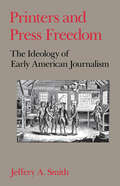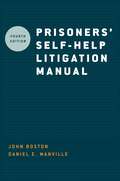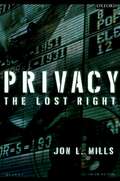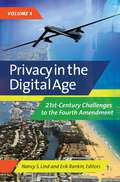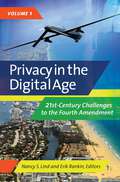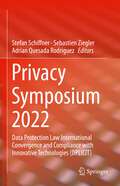- Table View
- List View
Printed Propaganda under Louis XIV: Absolute Monarchy and Public Opinion
by Joseph KlaitsIn the late seventeenth century the role of printed propaganda in manipulating public consciousness became increasingly explicit, and governments developed systematic controls over the printed word. This book considers the purposes, mechanisms, content, and audience of royal printed propaganda in early modern France. The author first sketches the impact of the invention of printing and characterizes propaganda generally during the reign of Louis XIV. In succeeding chapters he discusses the theory and practice of censorship and the government's relationships with the recently established French periodical press, presenting a balanced portrait of the crown's objectives and mixed success in influencing the sources of opinion. The varieties of government-inspired pamphlet propaganda are carefully and extensively analyzed, and signed royal propaganda receives special attention.Originally published in 1977.The Princeton Legacy Library uses the latest print-on-demand technology to again make available previously out-of-print books from the distinguished backlist of Princeton University Press. These editions preserve the original texts of these important books while presenting them in durable paperback and hardcover editions. The goal of the Princeton Legacy Library is to vastly increase access to the rich scholarly heritage found in the thousands of books published by Princeton University Press since its founding in 1905.
Printers and Press Freedom: The Ideology of Early American Journalism
by Jeffery A. SmithIn the United States, the press has sometimes been described as an unoffical fourth branch of government, a branch that serves as a check on the other three and provides the information necessary for a democracy to function. Freedom of the press--guaranteed but not defined by the First Amendment of the Constitution--can be fully understood only when examined in the context of the political and intellectual experiences of 18th-century America. Here, Jeffery A. Smith explores how Madison, Franklin, Jefferson, and their contemporaries came to see liberty of the press as a natural and vital part of a democratic republic. Drawing on sources ranging from political philosophers to court records and newspaper essayists, Printers and Press Freedom traces the development of a widespread conception of the press as necessarily exempt from all government restrictions, but still liable for the defamation of individuals. Smith carefully analyzes libertarian press theory and practice in the context of republican ideology and Enlightenment thought--paying particular attention to the cases of Benjamin Franklin and his relatives and associates in the printing business--and concludes that the generation that produced the First Amendment believed that government should not be trusted and that the press needed the broadest possible protection in order to serve as a check on the misuse of power.
The Printing Ink Manual
by Robert LeachThe Printing Ink Manual was first published in 1961 under the auspices of the Society of British Printing Ink Manufacturers with the object of providing an authoritative work on printing ink technology. This, the fourth edition, continues that purpose and presents a comprehensive study of the current 'state of the art' in the ink industry. For those starting in the printing ink industry it is a textbook dealing with all aspects of the formulation and manufacture of printing ink. For the ink technician it is a practical manual and useful source of reference. For printers and users of printed material the manual supplies helpful information on the nature and behaviour of ink both on the printing press and as the finished print. Readers with a little scientific knowledge will have no difficulty in using the manual. but as in previous editions, sufficient chemistry and physics have been introduced to assist the advanced technician and research scientist.
The Printing Ink Manual
by Robert Leach Ray PierceThe first edition of the Printing Ink Manual was published by the Society of British Printing Ink Manufacturers in 1961 to fill the need for an authorative textbook on printing technology, which would serve both as a training manual and a reliable reference book for everyday use. The book soon became established as a standard source of information on printing inks and reached its fourth edition by 1988. This, the fifth edition, is being published only five years later, so rapid has been the development in technology. The objective of the Printing Ink Manual remains unchanged. It is a practical handbook designed for use by everyone engaged in the printing ink industry and the associated industries. It provides all the information required by the ink technical for the day-to-day formulation of printing inks. It supplies the factory manager with details of the latest equipment and manufacturing methods, including large-scale production, and gives guidance on achieving quality assessment and total quality management specifications. Care has been taken to maintain the value of the Manual for training both technical personnel and others who requiresome kn- ledge of inks. Readers with little scientific knowledge will not find dif- culty in using the Manual, but sufficient chemistry and physics have been included to provide an explanation of the underlying principles and theories governing the behaviour of inks for use by the advanced te- nologist. Suppliers of raw materials, substrate manufacturers, printers and print users will find the book a valuable source of information.
Prison Cultures: Performance, Resistance, Desire
by Alwyn Walsh Aylwyn WalshPrison Cultures offers the first systematic examination of women in prison and performances in and of the institution. Using a feminist approach to reach beyond tropes of “bad girls” and simplistic inside vs. outside dynamics, it examines how cultural products can perpetuate or disrupt hegemonic understandings of the world of prisons.
Prisoners' Self-Help Litigation Manual
by John Boston Daniel E ManvillePrisoners' Self-Help Litigation Manual, in its much-anticipated fourth edition, is an indispensable guide for prisoners and prisoner advocates seeking to understand the rights guaranteed to prisoners by law and how to protect those rights. Clear, comprehensive, practical advice provides prisoners with everything they need to know on conditions of confinement, civil liberties in prison, procedural due process, the legal system, how to litigate, conducting effective legal research, and writing legal documents. Written by two legal and penitentiary experts with intimate knowledge of prisoner's rights and legal aid work, authors John Boston and Daniel E. Manville strategically focus on federal constitutional law, providing prisoners and those wishing to assist them with the most important information concerning legal rights. Over the past decade, prison law and conditions have changed significantly. This new edition is updated to include the most relevant prisoners' rights topics and approaches to litigation. Updates include all aspects of prison life as well as material on legal research, legal writing, types of legal remedies, and how to effectively use those remedies. Certainly the most authoritative, well-organized and relevant prisoner's rights manual available - - the eagerly awaited fourth edition should be purchased by everyone interested in civil rights for the incarcerated.
Prisoners' Self-Help Litigation Manual
by John Boston Daniel E ManvillePrisoners' Self-Help Litigation Manual, in its much-anticipated fourth edition, is an indispensable guide for prisoners and prisoner advocates seeking to understand the rights guaranteed to prisoners by law and how to protect those rights. Clear, comprehensive, practical advice provides prisoners with everything they need to know on conditions of confinement, civil liberties in prison, procedural due process, the legal system, how to litigate, conducting effective legal research, and writing legal documents. Written by two legal and penitentiary experts with intimate knowledge of prisoner's rights and legal aid work, authors John Boston and Daniel E. Manville strategically focus on federal constitutional law, providing prisoners and those wishing to assist them with the most important information concerning legal rights. Over the past decade, prison law and conditions have changed significantly. This new edition is updated to include the most relevant prisoners' rights topics and approaches to litigation. Updates include all aspects of prison life as well as material on legal research, legal writing, types of legal remedies, and how to effectively use those remedies. Certainly the most authoritative, well-organized and relevant prisoner's rights manual available - - the eagerly awaited fourth edition should be purchased by everyone interested in civil rights for the incarcerated.
Privacy: The Lost Right
by Jon L MillsThe disturbing reality of contemporary life is that technology has laid bare the private facts of most people's lives. Email, cell phone calls, and individual purchasing habits are no longer secret. Individuals may be discussed on a blog, victimized by an inaccurate credit report, or have their email read by an employer or government agency without their knowledge. Government policy, mass media, and modern technology pose new challenges to privacy rights, while the law struggles to keep up with the rapid changes. Privacy: The Lost Right evaluates the status of citizens' right to privacy in today's intrusive world. Mills reviews the history of privacy protections, the general loss of privacy, and the inadequacy of current legal remedies, especially with respect to more recent privacy concerns, such as identity theft, government surveillance, tabloid journalism, and video surveillance in public places. Mills concludes that existing regulations do not adequately protect individual privacy, and he presents options for improving privacy protections.
Privacy and Capitalism in the Age of Social Media (Routledge Research in Information Technology and Society)
by Sebastian SevignaniThis book explores commodification processes of personal data and provides a critical framing of the ongoing debate of privacy in the Internet age, using the example of social media and referring to interviews with users. It advocates and expands upon two main theses: First, people’s privacy is structurally invaded in contemporary informational capitalism. Second, the best response to this problem is not accomplished by invoking the privacy framework as it stands, because it is itself part of the problematic nexus that it struggles against. Informational capitalism poses weighty problems for making the Internet a truly social medium, and aspiring to sustainable privacy simultaneously means to struggle against alienation and exploitation. In the last instance, this means opposing the capitalist form of association – online and offline.
Privacy and Capitalism in the Age of Social Media (Routledge Research in Information Technology and Society #18)
by Sebastian SevignaniThis book explores commodification processes of personal data and provides a critical framing of the ongoing debate of privacy in the Internet age, using the example of social media and referring to interviews with users. It advocates and expands upon two main theses: First, people’s privacy is structurally invaded in contemporary informational capitalism. Second, the best response to this problem is not accomplished by invoking the privacy framework as it stands, because it is itself part of the problematic nexus that it struggles against. Informational capitalism poses weighty problems for making the Internet a truly social medium, and aspiring to sustainable privacy simultaneously means to struggle against alienation and exploitation. In the last instance, this means opposing the capitalist form of association – online and offline.
Privacy and Disclosure of Hiv in interpersonal Relationships: A Sourcebook for Researchers and Practitioners (Routledge Communication Series)
by Kathryn Greene Valerian J. Derlega Gust A. Yep Sandra PetronioAs the HIV epidemic enters its third decade, it remains one of the most pressing health issues of our time. Many aspects of the disease remain under-researched and inadequate attention has been given to the implications for the relationships and daily lives of those affected by HIV. Disclosing an HIV diagnosis remains a decision process fraught with difficulty and despite encouraging medical advances, an HIV diagnosis creates significant anxiety and distress about one's health, self-identity, and close relationships. This book provides an overarching view of existing research on privacy and disclosure while bringing together two significant areas: self-disclosure as a communication process and the social/relational consequences of HIV/AIDS. The unifying framework is communication privacy management and the focus of this volume is on private voluntary relational disclosure as opposed to forced or public disclosure. Utilizing numerous interviews with HIV patients and their families, the authors examine disclosure in a variety of social contexts, including relationships with intimate partners, families, friends, health workers, and coworkers. Of note are the examinations of predictors of willingness to disclose HIV infection, the message features of disclosure, and the consequences of both disclosure and non-disclosure. This volume, with its personal exercises and sources of additional information, offers an invaluable resource for individuals living with HIV and their significant others, as well as for professionals in the fields of health communication, social and health psychology, family therapy, clinical and counseling psychology, relationship research, infectious disease, and social service.
Privacy and Disclosure of Hiv in interpersonal Relationships: A Sourcebook for Researchers and Practitioners (Routledge Communication Series)
by Kathryn Greene Valerian J. Derlega Gust A. Yep Sandra PetronioAs the HIV epidemic enters its third decade, it remains one of the most pressing health issues of our time. Many aspects of the disease remain under-researched and inadequate attention has been given to the implications for the relationships and daily lives of those affected by HIV. Disclosing an HIV diagnosis remains a decision process fraught with difficulty and despite encouraging medical advances, an HIV diagnosis creates significant anxiety and distress about one's health, self-identity, and close relationships. This book provides an overarching view of existing research on privacy and disclosure while bringing together two significant areas: self-disclosure as a communication process and the social/relational consequences of HIV/AIDS. The unifying framework is communication privacy management and the focus of this volume is on private voluntary relational disclosure as opposed to forced or public disclosure. Utilizing numerous interviews with HIV patients and their families, the authors examine disclosure in a variety of social contexts, including relationships with intimate partners, families, friends, health workers, and coworkers. Of note are the examinations of predictors of willingness to disclose HIV infection, the message features of disclosure, and the consequences of both disclosure and non-disclosure. This volume, with its personal exercises and sources of additional information, offers an invaluable resource for individuals living with HIV and their significant others, as well as for professionals in the fields of health communication, social and health psychology, family therapy, clinical and counseling psychology, relationship research, infectious disease, and social service.
Privacy and Security for Mobile Crowdsourcing (River Publishers Series in Digital Security and Forensics)
by Shabnam SodagariThis concise guide to mobile crowdsourcing and crowdsensing vulnerabilities and countermeasures walks readers through a series of examples, discussions, tables, initiative figures, and diagrams to present to them security and privacy foundations and applications. Discussed approaches help build intuition to apply these concepts to a broad range of system security domains toward dimensioning of next generations of mobiles crowdsensing applications. This book offers vigorous techniques as well as new insights for both beginners and seasoned professionals. It reflects on recent advances and research achievements. Technical topics discussed in the book include but are not limited to: Risks affecting crowdsensing platforms Spatio-temporal privacy of crowdsourced applications Differential privacy for data mining crowdsourcing Blockchain-based crowdsourcing Secure wireless mobile crowdsensing. This book is accessible to readers in mobile computer/communication industries as well as academic staff and students in computer science, electrical engineering, telecommunication systems, business information systems, and crowdsourced mobile app developers.
Privacy and Security for Mobile Crowdsourcing (River Publishers Series in Digital Security and Forensics)
by Shabnam SodagariThis concise guide to mobile crowdsourcing and crowdsensing vulnerabilities and countermeasures walks readers through a series of examples, discussions, tables, initiative figures, and diagrams to present to them security and privacy foundations and applications. Discussed approaches help build intuition to apply these concepts to a broad range of system security domains toward dimensioning of next generations of mobiles crowdsensing applications. This book offers vigorous techniques as well as new insights for both beginners and seasoned professionals. It reflects on recent advances and research achievements. Technical topics discussed in the book include but are not limited to: Risks affecting crowdsensing platforms Spatio-temporal privacy of crowdsourced applications Differential privacy for data mining crowdsourcing Blockchain-based crowdsourcing Secure wireless mobile crowdsensing. This book is accessible to readers in mobile computer/communication industries as well as academic staff and students in computer science, electrical engineering, telecommunication systems, business information systems, and crowdsourced mobile app developers.
Privacy and the Role of International Law in the Digital Age (Oxford Data Protection & Privacy Law)
by Kinfe YilmaThis book examines the role of international law in securing privacy and data protection in the digital age. Driven mainly by the transnational nature of privacy threats involving private actors as well as States, calls are increasingly made for an international privacy framework to meet these challenges. Mapped against a flurry of global privacy initiatives, the book provides the first comprehensive analysis of the extent to which and whether international law attends to the complexities of upholding digital privacy. The book starts by exploring boundaries of international privacy law in upholding privacy and data protection in the digital ecosystem where threats to privacy are increasingly transnational, sophisticated and privatized. It then explores the potential of global privacy initiatives, namely Internet bills of rights, universalization of regional systems of data privacy protection, and the multi-level privacy discourse at the United Nations, in reimagining the normative contours of international privacy law. Having shown limitations of global privacy initiatives, the book proposes a pragmatic approach that could make international privacy law better-equipped in the digital age.
Privacy and the Role of International Law in the Digital Age (Oxford Data Protection & Privacy Law)
by Kinfe YilmaThis book examines the role of international law in securing privacy and data protection in the digital age. Driven mainly by the transnational nature of privacy threats involving private actors as well as States, calls are increasingly made for an international privacy framework to meet these challenges. Mapped against a flurry of global privacy initiatives, the book provides the first comprehensive analysis of the extent to which and whether international law attends to the complexities of upholding digital privacy. The book starts by exploring boundaries of international privacy law in upholding privacy and data protection in the digital ecosystem where threats to privacy are increasingly transnational, sophisticated and privatized. It then explores the potential of global privacy initiatives, namely Internet bills of rights, universalization of regional systems of data privacy protection, and the multi-level privacy discourse at the United Nations, in reimagining the normative contours of international privacy law. Having shown limitations of global privacy initiatives, the book proposes a pragmatic approach that could make international privacy law better-equipped in the digital age.
Privacy-Enhancing Aggregation Techniques for Smart Grid Communications (Wireless Networks)
by Rongxing LuThis book provides an overview of security and privacy issues in smart grid communications, as well as the challenges in addressing these issues. It also introduces several privacy enhancing aggregation techniques including multidimensional data aggregation, subset data aggregation, multifunctional data aggregation, data aggregation with fault tolerance, data aggregation with differential privacy, and data aggregation with integrity protection. Offering a comprehensive exploration of various privacy preserving data aggregation techniques, this book is an exceptional resource for the academics, researchers, and graduate students seeking to exploit secure data aggregation techniques in smart grid communications and Internet of Things (IoT) scenarios.
Privacy-Enhancing Fog Computing and Its Applications (SpringerBriefs in Electrical and Computer Engineering)
by Xiaodong Lin Jianbing Ni Xuemin Sherman ShenThis SpringerBrief covers the security and privacy challenges in fog computing, and proposes a new secure and privacy-preserving mechanisms to resolve these challenges for securing fog-assisted IoT applications. Chapter 1 introduces the architecture of fog-assisted IoT applications and the security and privacy challenges in fog computing. Chapter 2 reviews several promising privacy-enhancing techniques and illustrates examples on how to leverage these techniques to enhance the privacy of users in fog computing. Specifically, the authors divide the existing privacy-enhancing techniques into three categories: identity-hidden techniques, location privacy protection and data privacy enhancing techniques. The research is of great importance since security and privacy problems faced by fog computing impede the healthy development of its enabled IoT applications. With the advanced privacy-enhancing techniques, the authors propose three secure and privacy-preserving protocols for fog computing applications, including smart parking navigation, mobile crowdsensing and smart grid. Chapter 3 introduces identity privacy leakage in smart parking navigation systems, and proposes a privacy-preserving smart parking navigation system to prevent identity privacy exposure and support efficient parking guidance retrieval through road-side units (fogs) with high retrieving probability and security guarantees. Chapter 4 presents the location privacy leakage, during task allocation in mobile crowdsensing, and propose a strong privacy-preserving task allocation scheme that enables location-based task allocation and reputation-based report selection without exposing knowledge about the location and reputation for participators in mobile crowdsensing. Chapter 5 introduces the data privacy leakage in smart grid, and proposes an efficient and privacy-preserving smart metering protocol to allow collectors (fogs) to achieve real-time measurement collection with privacy-enhanced data aggregation. Finally, conclusions and future research directions are given in Chapter 6. This brief validates the significant feature extension and efficiency improvement of IoT devices without sacrificing the security and privacy of users against dishonest fog nodes. It also provides valuable insights on the security and privacy protection for fog-enabled IoT applications. Researchers and professionals who carry out research on security and privacy in wireless communication will want to purchase this SpringerBrief. Also, advanced level students, whose main research area is mobile network security will also be interested in this SpringerBrief.
Privacy in Dynamical Systems
by Farhad FarokhiThis book addresses privacy in dynamical systems, with applications to smart metering, traffic estimation, and building management. In the first part, the book explores statistical methods for privacy preservation from the areas of differential privacy and information-theoretic privacy (e.g., using privacy metrics motivated by mutual information, relative entropy, and Fisher information) with provable guarantees. In the second part, it investigates the use of homomorphic encryption for the implementation of control laws over encrypted numbers to support the development of fully secure remote estimation and control. Chiefly intended for graduate students and researchers, the book provides an essential overview of the latest developments in privacy-aware design for dynamical systems.
Privacy in the Digital Age [2 volumes]: 21st-Century Challenges to the Fourth Amendment [2 volumes]
by Nancy S. Lind and Erik RankinA collection of expert essays examines the privacy rights that have been lost in the post-9/11 era—giving students and others the knowledge they need to take back their constitutional protections.This timely two-volume collection shares information every citizen should have, tackling the erosion of privacy rights engendered by the ability of digital technology to intercept, mine, and store personal data, most often without the knowledge of those being monitored. Examining its subject through the lens of Fourth Amendment rights, the work focuses on technological advances that now gather personal data on an unprecedented scale, whether by monitoring social media, tracking cell phones, or using thermal imaging to watch people's movement. It also examines the possible impact of the widespread gathering of such data by law enforcement and security agencies and by private corporations such as Google.Organized by hot-button topics confronting U.S. citizens in the post-9/11 era, the work reviews the original intent of the Fourth Amendment and then traces the development and erosion of interpretations of that amendment in the 21st century. Topical essays offer a comprehensive treatment and understanding of current Fourth Amendment issues, including those that have been brought before the courts and those relative to the continuing governmental and societal emphasis on security and public safety since the Columbine shootings in 1999 and the events of September 11, 2001.
Privacy in the Digital Age [2 volumes]: 21st-Century Challenges to the Fourth Amendment [2 volumes]
A collection of expert essays examines the privacy rights that have been lost in the post-9/11 era—giving students and others the knowledge they need to take back their constitutional protections.This timely two-volume collection shares information every citizen should have, tackling the erosion of privacy rights engendered by the ability of digital technology to intercept, mine, and store personal data, most often without the knowledge of those being monitored. Examining its subject through the lens of Fourth Amendment rights, the work focuses on technological advances that now gather personal data on an unprecedented scale, whether by monitoring social media, tracking cell phones, or using thermal imaging to watch people's movement. It also examines the possible impact of the widespread gathering of such data by law enforcement and security agencies and by private corporations such as Google.Organized by hot-button topics confronting U.S. citizens in the post-9/11 era, the work reviews the original intent of the Fourth Amendment and then traces the development and erosion of interpretations of that amendment in the 21st century. Topical essays offer a comprehensive treatment and understanding of current Fourth Amendment issues, including those that have been brought before the courts and those relative to the continuing governmental and societal emphasis on security and public safety since the Columbine shootings in 1999 and the events of September 11, 2001.
Privacy Online: Perspectives on Privacy and Self-Disclosure in the Social Web
by Sabine Trepte and Leonard ReineckeCommunications and personal information that are posted online are usually accessible to a vast number of people. Yet when personal data exist online, they may be searched, reproduced and mined by advertisers, merchants, service providers or even stalkers. Many users know what may happen to their information, while at the same time they act as though their data are private or intimate. They expect their privacy will not be infringed while they willingly share personal information with the world via social network sites, blogs, and in online communities.The chapters collected by Trepte and Reinecke address questions arising from this disparity that has often been referred to as the privacy paradox. Works by renowned researchers from various disciplines including psychology, communication, sociology, and information science, offer new theoretical models on the functioning of online intimacy and public accessibility, and propose novel ideas on the how and why of online privacy. The contributing authors offer intriguing solutions for some of the most pressing issues and problems in the field of online privacy. They investigate how users abandon privacy to enhance social capital and to generate different kinds of benefits. They argue that trust and authenticity characterize the uses of social network sites. They explore how privacy needs affect users’ virtual identities. Ethical issues of privacy online are discussed as well as its gratifications and users’ concerns. The contributors of this volume focus on the privacy needs and behaviors of a variety of different groups of social media users such as young adults, older users, and genders. They also examine privacy in the context of particular online services such as social network sites, mobile internet access, online journalism, blogs, and micro-blogs.In sum, this book offers researchers and students working on issues related to internet communication not only a thorough and up-to-date treatment of online privacy and the social web. It also presents a glimpse of the future by exploring emergent issues concerning new technological applications and by suggesting theory-based research agendas that can guide inquiry beyond the current forms of social technologies.
Privacy Preservation in Distributed Systems: Algorithms and Applications (Signals and Communication Technology)
by Anqi Zhang Ping Zhao Guanglin ZhangThis book provides a discussion of privacy in the following three parts: Privacy Issues in Data Aggregation; Privacy Issues in Indoor Localization; and Privacy-Preserving Offloading in MEC. In Part 1, the book proposes LocMIA, which shifts from membership inference attacks against aggregated location data to a binary classification problem, synthesizing privacy preserving traces by enhancing the plausibility of synthetic traces with social networks. In Part 2, the book highlights Indoor Localization to propose a lightweight scheme that can protect both location privacy and data privacy of LS. In Part 3, it investigates the tradeoff between computation rate and privacy protection for task offloading a multi-user MEC system, and verifies that the proposed load balancing strategy improves the computing service capability of the MEC system. In summary, all the algorithms discussed in this book are of great significance in demonstrating the importance of privacy.
Privacy-Preserving Machine Learning for Speech Processing (Springer Theses)
by Manas A. PathakThis thesis discusses the privacy issues in speech-based applications such as biometric authentication, surveillance, and external speech processing services. Author Manas A. Pathak presents solutions for privacy-preserving speech processing applications such as speaker verification, speaker identification and speech recognition. The author also introduces some of the tools from cryptography and machine learning and current techniques for improving the efficiency and scalability of the presented solutions. Experiments with prototype implementations of the solutions for execution time and accuracy on standardized speech datasets are also included in the text. Using the framework proposed may now make it possible for a surveillance agency to listen for a known terrorist without being able to hear conversation from non-targeted, innocent civilians.
Privacy Symposium 2022: Data Protection Law International Convergence and Compliance with Innovative Technologies (DPLICIT)
by Stefan Schiffner Sebastien Ziegler Adrian Quesada RodriguezThis book presents a collection of high-quality research works and professional perspectives arising from the call for papers of the Privacy Symposium 2022; an international conference aimed towards the promotion of international dialogue, cooperation and knowledge sharing on data protection regulations, compliance and emerging technologies. Gathering legal and technology expertise, this publication provides cutting-edge perspectives on the convergence of international data protection regulations, as well as data protection compliance of emerging technologies, such as: Artificial Intelligence, e-health, blockchain, edge computing, Internet of things, V2X and Smart Grids. It includes selected papers from the Privacy Symposium conference 2022 (PSC 2022) call for papers, encompassing relevant topics, including: international law and comparative law in data protection cross-border data transfers emerging technologies and data protection compliance data protection by design technologic solutions for data protection compliance data protection good practices across industries and verticals cybersecurity and data protection assessment and certification of data protection compliance, and data subject rights implementation This publication includes papers authored by academics and professionals involved on various areas of data protection, technical, legal and compliance services.Chapter 8 and 10 are available open access under a Creative Commons Attribution 4.0 International License via link.springer.com

